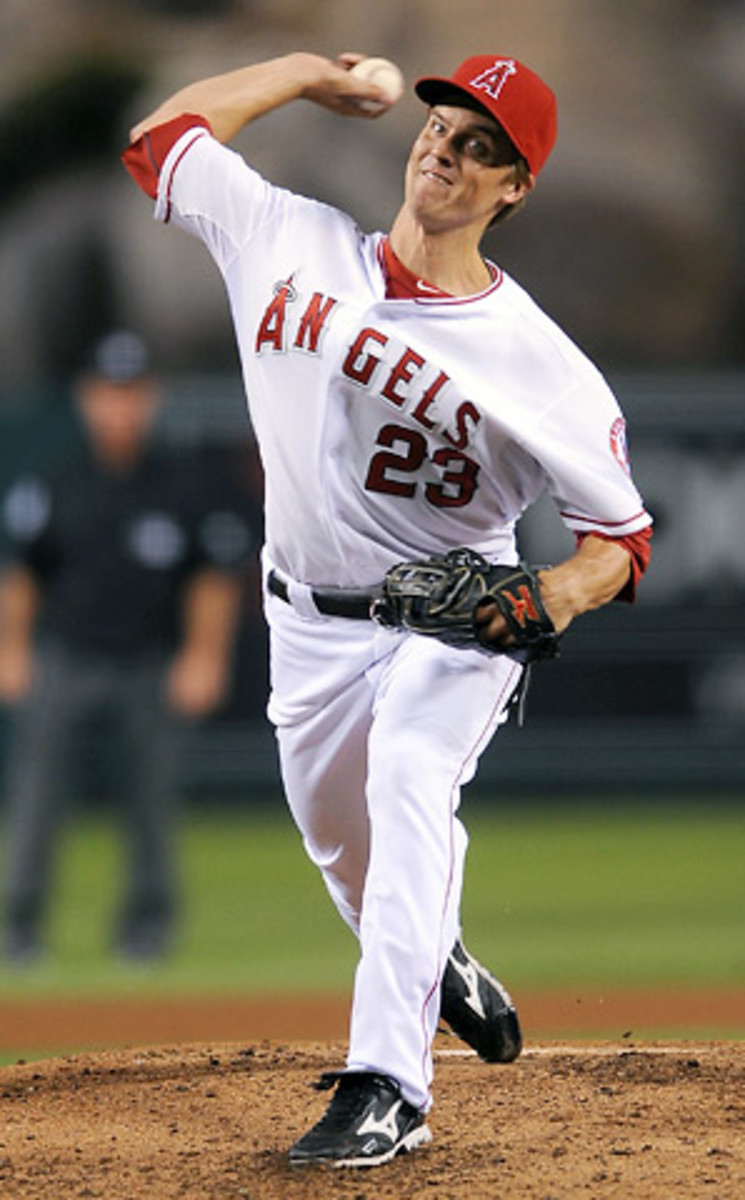
Dodgers win Greinke sweepstakes
It's hard to know for whom this is a bigger day: Greinke for his contract, the Dodgers for their financial might, the offseason market for what will come next or the league for its western power shift.
The agreement, which was first reported by Gina Miller from Dallas television station TXA21 and was confirmed by SI.com, sets a few precedents.
It is the highest average annual value for a pitcher ($24.5 million) and the highest total value for any right-handed pitcher ($147 million). The Dodgers become the first National League club to exceed a $200 million player payroll ($210 million and counting for active players next year, according to Cot's Baseball Contracts) and only the second franchise in the majors to have four players concurrently with a $20 million AAV (along with the Phillies).
Greinke will only be a No. 2 starter where he's going (behind incumbent ace Clayton Kershaw), but he was the clear No. 1 man in this year's free-agent market and will now pitch with the onus of being the highest-paid pitcher on the richest team in the nation's second-largest city.
The 29-year-old, who has battled anxiety and depression that nearly led to him quitting baseball six years ago, spent the final two months of last season in the L.A. market as a member of the Angels, to whom he was traded by the Brewers at the deadline. Greinke had near-equal success for both teams last year, combining to go 15-5 with a 3.48 ERA in 212 1/3 innings with 200 strikeouts.
Greinke has only had one truly superlative season in his career in the midst of many good ones. He won the 2009 AL Cy Young with the Royals when he went 16-8 with a major league-leading 2.16 ERA (a 205 ERA+ adjusted for league and ballpark), with 242 strikeouts in 229 1/3 innings. In three years since he's gone 41-25 with a 3.83 ERA -- a 106 ERA+ that's only six percentage points above league average -- while averaging 194 strikeouts and 201 innings.
He's been a very good pitcher who hasn't always ranked among the game's first tier of aces -- he has, for instance, only made one All-Star appearance. It's clear, however, that he's the prime beneficiary of baseball's new paradigm.
This winter the Northeast elite are showing uncharacteristic restraint. The Yankees have played pauper so far this winter by stringently adhering to a budget plan that will get them under the $189 million luxury tax threshold by 2014; the Red Sox are spending in a controlled, short-term fashion after making a $250 million salary dump last August while trading first baseman Adrian Gonzalez, left fielder Carl Crawford and starter Josh Beckett to the Dodgers; and the Phillies recently chose to fill their center field hole by trading for Ben Revere, who makes roughly the league minimum salary, rather than signing Michael Bourn to a lucrative deal.
Out west, meanwhile, it's a different story. The Dodgers, who will pay 10 players at least eight figures (all $11 million and up) for '13, already have some $175 million committed for '14. The Giants have run their payroll up to an estimated $140 million, which is about $60 million higher than it was as recently as 2009.
The Dodgers, Rangers and Angels were the top three suitors for Greinke and, probably not coincidentally, all three West division teams have recently started or are about to start billion dollar TV deals, highlighted by the Dodgers' contract, which the L.A. Times reports will probably be worth more than $6 billion. According to Cot's, the Rangers ($120 million) and the Angels ($154 million) each had franchise-record payrolls last year, each ranking in the top-six.
In fact, the Greinke deal comes exactly one year after the Angels signed first baseman Albert Pujols and starter C.J. Wilson, seemingly asserting themselves as Los Angeles' premier franchise. After all, back then the Dodgers were still mired in the divorce proceedings of former owner Frank McCourt.
Since then the Dodgers were sold to a dream ownership group bankrolled by Guggenheim Partners, with L.A. Lakers legend Magic Johnson as the face of the group and Stan Kasten -- the well respected former president of the Braves and Nationals -- as part-owner and team president. Kasten promised that the Dodgers would be aggressive in improving themselves quickly, and that's exactly what they've done, through trades for Gonzalez, Crawford, Beckett and Hanley Ramirez and now the signing of Greinke.
Now the Dodgers will likely end the Yankees' 15-year run as having baseball's biggest payroll.
Even before this contract baseball's Hot Stove had seen an impact from an influx of expected money from a new national TV deal that will pay each franchise some $25 million additional revenue per year starting in 2014, though that pales compared to the more than $240 million per year the Dodgers' regional contract will reportedly pay them.
In addition to deepening a Dodgers rotation that ranked third in the majors with a 3.41 ERA last season, Greinke may have opened the sluggish floodgates for the signings of other elite free agents. Though B.J. Upton signed with the Braves the week before the winter meetings, Greinke, Josh Hamilton, Nick Swisher, Michael Bourn and Anibal Sanchez were all available last week.
Given the complicated competing interests of this winter's top bidders aligned, the market had come to a standstill waiting for Greinke to sign, presumed to be because the Rangers sought both the top pitcher available (Greinke) as well as the top hitter available (Hamilton). Perhaps the other dominoes will start to fall, creating a flurry of activity this week.
The Dodgers may not even be done wheeling and dealing this winter and could even join the bidding for another starter like Sanchez. But no matter the finished product, come the spring and summer they'll need to turn their new roster into a winner. With big payroll comes big pressure.




